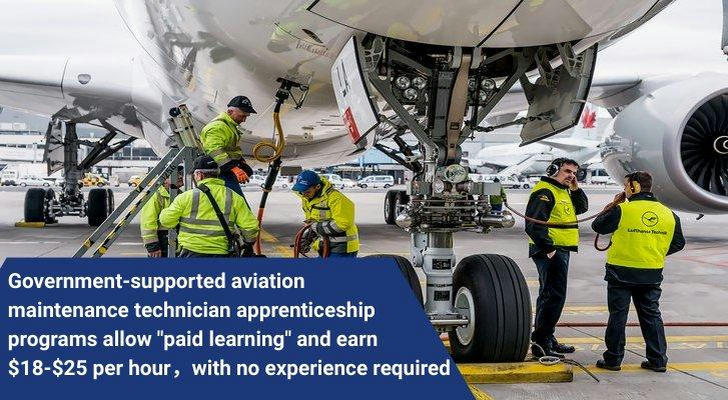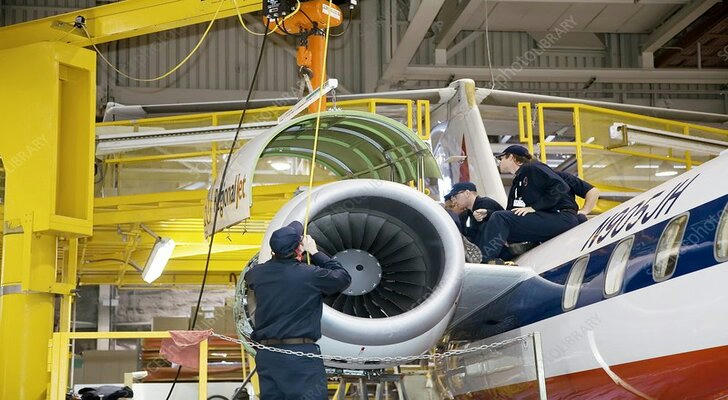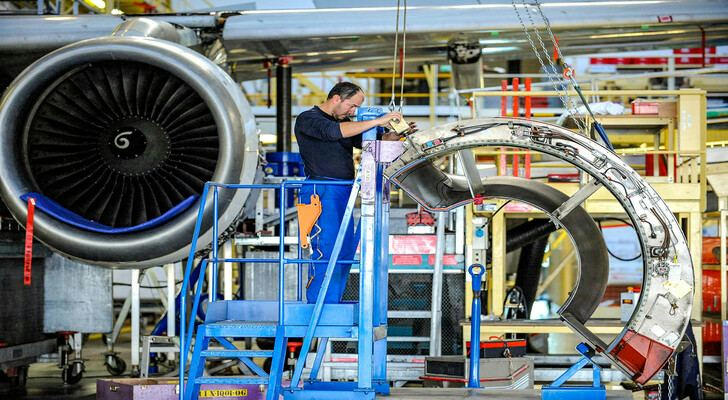Earn while you learn - Government-supported aviation maintenance apprenticeship program
Want to get into the aircraft maintenance industry, but worried about tuition and income? Good news: You don't need any experience to get started. With the support of the US government's apprenticeship program, you can get paid while you learn. In addition, you will get industry-recognized certifications, which will open the door to high-paying aviation positions.

✅ Why so many beginners choose aviation maintenance
If you are just entering the industry or are considering a career change, aviation maintenance is one of your smartest choices. Here are the reasons why it is so popular:
1️⃣ Stable employment demand
According to the Federal Aviation Administration (FAA), the industry needs about 18,000 new aviation technicians each year to meet industry demand. Whether it is airlines, military contractors or private aircraft services, the demand for well-trained technicians in all walks of life is growing.
2️⃣ Great pay and benefits
Even newbies can earn a good income, and most jobs offer full benefits like health insurance, 401(k) retirement plans, and even travel discounts.
3️⃣ Rich career paths
It's not just airlines—over 40% of technicians work in fields like aerospace manufacturing, drone services, or business aviation. That means flexibility whether you want to work in a big city or a small town.
💰 Aviation Maintenance Technician Salaries
A career in aviation is not only fun, but also financially rewarding. Here's a look at what different job titles will earn in 2025:
• Aircraft Mechanic: Average annual salary is around $81,600, with entry-level starting salaries approaching $52,000 and popular specialty positions earning well over $110,000.
• Avionics Technician: Average hourly pay for aircraft electronics specialists is $33, with top hourly pay approaching $47.
• Inspector and Quality Assurance Specialist: Focused on safety and compliance, annual salaries are around $92,000, with senior specialists making over $130,000.
Bonuses, overtime, and union benefits can add an additional $10,000 to $20,000 per year.
🔧 Why Choose Aviation Maintenance Apprenticeships
Aviation apprenticeships offer you an ideal way to enter the industry without a college degree.
✅ Earn While You Train: Most apprentices make between $18 and $25 per hour—so you can avoid student loans while still covering your daily expenses.
✅ Get Top Qualifications: You’ll earn your FAA A&P certification, a key license required to work in aviation maintenance.
✅ Hands-On Learning: You’ll get real-world experience repairing engines, troubleshooting systems, and working with advanced technology on today’s aircraft.
✅ Nationwide Coverage: From Alaska to Florida, there are training centers in more than 200 cities across the U.S.
✅ High Employability: Many programs work with companies like Boeing or Delta Airlines. In fact, 85-90% of graduates find employment shortly after earning their certification.

🌎 For All Ages and Backgrounds
There is no age limit, and you don’t even need to have a technical background to thrive in this career.
18-35: Great for those who don’t want to go through college debt. More than 60% of new technicians are under 30.
35-55: Many career changers thrive here. A 2024 survey found that 32% of apprentices are mid-career professionals from fields like automotive repair or IT.
55+: Retirees and veterans often choose to work part-time. Many choose to work as consultants or inspectors because of the flexible hours.
✨ What You'll Learn During Training
The apprenticeship combines classroom instruction with hands-on shop experience. You'll develop critical skills in the following areas:
Safety & Inspections: Learn how to spot potential problems before they become serious.
Engine Repair: Practice rebuilding jet and piston engines from the inside out.
Avionics: Get hands-on experience with the latest communications and navigation technology.
Composites Repair: Learn how to repair modern aircraft materials like carbon fiber.
Regulations & Safety Standards: Learn Federal Aviation Administration (FAA) regulations to ensure aircraft are always ready to take off.
You'll also develop soft skills like teamwork and communication, which are critical in a fast-paced aviation environment.
📋 Eligibility and Application Requirements
You don't need to be an expert or have any aviation background. To Apply:
• Must be 18 years of age or older and have a high school diploma or GED.
• Passion for hands-on work and mechanical ability.
• Commitment to complete 18 to 24 months of training.
• Legal eligibility to work in the United States
Don't have any aviation knowledge? No problem. Instructors will start with the basics like tool identification and safety procedures.

📈 Career development: Growth path from apprentice to industry expert
Entering the aviation maintenance industry is just the starting point. With the accumulation of experience and the improvement of skills, there is a wide space for career development:
• Junior technician (1-3 years): After completing training, you can perform maintenance and basic inspection work in airlines, maintenance bases or military projects. The focus is on accumulating experience and becoming familiar with various aircraft systems.
• Intermediate technician (3-7 years): After a certain number of years of experience, you can choose to specialize in a certain field, such as avionics, structural maintenance or turbine engine maintenance. At the same time, you have the ability to teach and can be promoted to a team leader.
• Senior maintenance supervisor or quality specialist (7-10 years): You can serve as a supervisory position, responsible for technical review, safety management and team coordination, and may also participate in the evaluation and improvement of new aircraft projects.
• Senior consultant, training instructor (more than 10 years): You can provide consulting and teaching for airlines or training institutions, and even participate in policy formulation or open a private maintenance station.
Many people start as front-line technicians and eventually move to management, business owners or senior experts. As long as you maintain a learning attitude and hands-on spirit, this industry will bring long-term career growth and a sense of accomplishment.
👨🔧 Conclusion
Learning a skill means you have the opportunity to create a better future. The aircraft maintenance industry provides fair opportunities for everyone. No matter what your starting point is, as long as you work hard and receive professional training, you can start your apprenticeship journey immediately and move towards a successful aircraft maintenance career!
